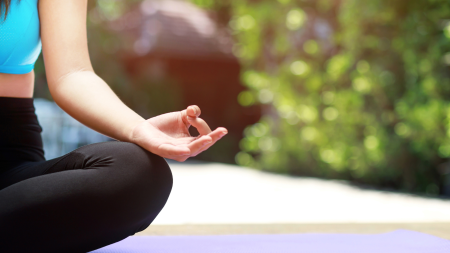
Mindfulness — or How to Be Here & Now
Have you come across the term mindfulness before? It can be described in other words as full awareness and it is sometimes also referred to as presence. In fact, all these concepts lead to the heart of the meaning of this type of practice, which is characterized by directing attention to the present moment and awareness of the transience of thoughts and emotions. Being here and now, fully in the present moment, without evaluation. Sounds interesting, doesn’t it? 🙂
Although the concept of mindfulness dates back to antiquity, it has been gaining popularity in recent years. More and more research studies are focused on the health benefits of practicing mindfulness in everyday life. The topics that are analyzed include the positive impact of mindfulness on coping with stress, reducing anxiety or racing thoughts, supporting the immune system, as well as increasing efficiency at work or in sport.
Mindfulness turned out to be an effective tool for reducing stress and anxiety during the recent pandemic. It is also used as one of the therapeutic techniques in working not only with adults, but also with children and adolescents. The positive effects of mindfulness on supporting the treatment of eating disorders, attention deficit hyperactivity disorder and cardiovascular diseases are also analyzed. The potential benefits of using mindfulness techniques are therefore very promising and it is worth introducing them to your everyday life and observing the positive effects. 🙂
5 Principles of Mindfulness
For years I have been trying to live according to the principles of mindfulness which have helped me in my own development and achieving daily balance. The main principles of mindfulness that I follow are:
Conscious breathing.
Working with the breath and its conscious practice support effective coping with stressful situations in everyday life. They help to increase the experience of self and nature, thus facilitating calming down.
Focusing on one thing at a time.
It allows for more effective activity, greater awareness of the activities performed and maintaining greater peace of mind.
Performing daily activities in a different way than usual.
This is the best attempt to avoid the routine, but also to increase the conscious approach to the activities performed. When we do things automatically, it is harder for us to maintain full awareness. We are losing the charm of the moment. That is why it is worth taking a break for a moment and doing your daily task differently – more consciously.
Asking yourself questions about emotions.
Finding space to observe your emotions is a very important element of mindfulness. It’s not about evaluating or criticizing them, but about naming and becoming aware of their existence.
Pausing, taking a short break with yourself.
The essence of mindfulness, stopping in the present moment. Being with your emotions and feelings.

Remember that every small step that leads us to feel better is important. You can always start with simple activities and then expand their range, adding new points to your daily rituals.
In addition to the rules mentioned above, everyday activities such as listening to music, taking photos, practicing yoga, practicing calligraphy or practicing guided meditation can help in being here and now. Remember that you can also find meditations in my application, in the Balance tab (HERE).
The practice of mindfulness can bring benefits in many areas of life, so I encourage you to try its effects on your own. Let me know in the comments what changes you have noticed. 🙂
Bibliography:
- Behan C. The benefits of meditation and mindfulness practices during times of crisis such as COVID-19. Ir J Psychol Med. 2020 Dec;37(4):256-258. doi: 10.1017/ipm.2020.38. Epub 2020 May 14. PMID: 32406348; PMCID: PMC7287297.
- Black DS, Slavich GM. Mindfulness meditation and the immune system: a systematic review of randomized controlled trials. Ann N Y Acad Sci. 2016 Jun;1373(1):13-24. doi:10.1111/nyas.12998. Epub 2016 Jan 21. PMID: 26799456; PMCID: PMC4940234.
- Keng SL, Smoski MJ, Robins CJ. Effects of mindfulness on psychological health: a review of empirical studies. Clin Psychol Rev. 2011 Aug;31(6):1041-56. doi: 10.1016/j.cpr.2011.04.006. Epub 2011 May 13. PMID: 21802619; PMCID: PMC3679190.
- Zhang D, Lee EKP, Mak ECW, Ho CY, Wong SYS. Mindfulness-based interventions: an overall review. Br Med Bull. 2021 Jun 10;138(1):41-57. doi: 10.1093/bmb/ldab005. PMID: 33884400; PMCID: PMC8083197.
-
Żejmo J. Praktyka Mindfulness jako skuteczna metoda poprawy umiejętności radzenia sobie ze stresem [w:] Edukacja Humanistyczna nr 2 (47), Szczecin 2022









Comments No Comments
Join the discussion…